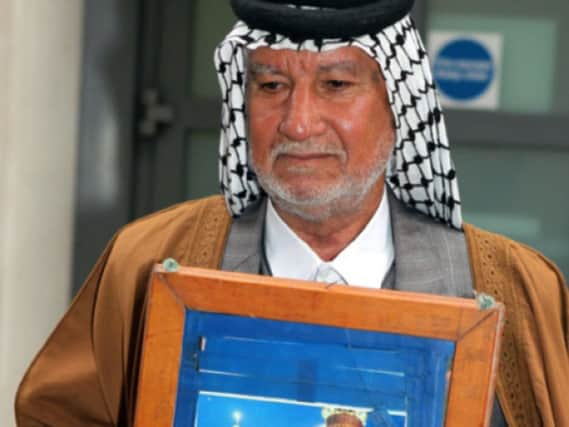Claims of torture by troops in Iraq ‘a conspiracy’


In closing statements to the Al-Sweady Inquiry, lawyers for British soldiers and the Ministry of Defence said claims that UK troops killed Iraqis after the Battle of Danny Boy in May 2004, as well as torturing detainees and mutilating bodies, were untrue and had caused “immense anxiety and distress” to a number of soldiers, and a cost of more than £22 million to the public purse.
They accused Iraqis who made the allegations of actively trying to deceive the inquiry into believing detainees had been mistreated for an “ulterior motive” of financial compensation.
Advertisement
Hide AdAdvertisement
Hide AdThe inquiry was set up to examine allegations that 20 or more Iraqis were unlawfully killed at Camp Abu Naji (CAN) near Majar-al-Kabir in southern Iraq on May 14 and 15 2004, and that detainees were ill-treated there and later at Shaibah Logistics Base.
Oral hearings started last year and it has heard evidence from nearly 300 witnesses, including 222 military witnesses.
But in an unprecedented move, the claims of unlawful killing of Iraqi civilians by British soldiers were dropped last month after lawyers representing the alleged victims’ families admitted there was no evidence it happened.
The inquiry, set up in 2009 amid a judicial review brought by Iraqi claimants, will continue to examine allegations of mistreatment of Iraqi detainees after the battle.
In a closing statement today, lawyers for the MoD said it had become clear that allegations of murder were untrue.
“The untruthful allegations cannot be attributed to honest mistakes or misunderstandings. They are the product of a conspiracy between a number of the Iraqi core participants to pervert the course of justice.
“The conspiracy has resulted in immense anxiety and distress to a number of brave servicemen and a cost to British taxpayers of well in excess of £20 million.”
The MoD also dismissed several other allegations - including claims that British soldiers used “microbial weapons” - as “patently untrue”.
Advertisement
Hide AdAdvertisement
Hide AdIt admitted there had been “some instances” where conduct of British soldiers fell below expected standards, such as a detainee being shouted at and plasticuffs being applied incorrectly, but they were on a different scale to allegations of murder, torture and mutilation.
Neil Garnham QC, from Treasury Solicitors, which represented many of the British personnel involved in the inquiry, said that some Iraqi witnesses had resorted to “elaborate fabrication” to explain why they and others were on the battlefield in the first place.
He said: “If the inquiry concludes, contrary to their accounts, they were involved in the ambush, then they have all repeatedly, persistently and deliberately given false evidence, including on oath, to you sir.”
Mr Garnham said there had been no systematic mistreatment of detainees at CAN and accounts of alleged abuse were “implausible, confused and internally inconsistent”, with some detainees having “exaggerated and fabricated” their accounts of ill-treatment.
He said there had been a “deliberate and co-ordinated” attempt by the nine detainees to give misleading evidence about mistreatment, saying: “they actively participated in attempts to deceive the court and this inquiry into believing that Iraqis...were tortured.
“The witnesses, in addition to having an ulterior motive to make allegations of mistreatment in the form of financial compensation, have expressed violent antipathy towards coalition forces.”
But Patrick O’Connor, QC, from Public Interest Lawyers - representing the Iraqi claimants - said although original allegations of unlawful killing had been dropped, claims of mistreatment were “grave indeed”.
He said if the MoD had set up its own “effective, prompt and independent investigation”, it could have achieved what the inquiry had achieved “years ago and at a small fraction of the cost”.
Advertisement
Hide AdAdvertisement
Hide Ad“None of this would have been necessary if they had acted responsibly and in the public interest years ago.
“The heavy cost of this inquiry is the heavy cost of their dereliction of legal, moral and professional duty.”
Of allegations of mistreatment, he said: “These issues are grave indeed: gross violations of the Geneva Conventions, inhuman and degrading treatment of wounded, broken and helpless young men, who were utterly at the mercy of their military handlers and interrogators.”
Mr O’Connor said there had been “stirrings of controversy” over the relationship between the armed forces and the “rule of law”, saying: “It would be a tidy landscape if our armed forces were safe from accountability to the rule of law.
“Some may describe that as Arcadian. Some others may describe it perhaps as Orwellian.
“Sir, we are witnesses to the cold arrogance of the British state at work.”
The inquiry chairman Sir Thayne Forbes is expected to produce his report by the end of this year.
SEE ALSO